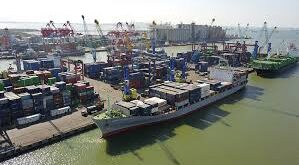Related Articles
The Importance of Container Transport in Melbourne
Melbourne’s strategic location and infrastructure make it a prime centre for container transport within Australia. Port of Melbourne, Australia’s largest container and general cargo port, handles millions of containers annually, serving as a gateway for importing and exporting goods. Whether it’s retail, automotive, agricultural, or industrial cargo, businesses depend on reliable container transport services to ensure smooth operations.
Container transport services in Melbourne are essential for the local economy, providing direct and indirect employment and supporting businesses of all sizes. The logistics and freight industry in Melbourne has evolved over the years, adapting to technological advancements, environmental regulations, and shifting market demands to meet the needs of local and global businesses.
Types of Container Transport Services in Melbourne
Container transport involves more than just moving goods from one location to another. Different transport modes and specialized services cater to a variety of needs. Here are some primary types of container transport services available in Melbourne:
1. Road Transport
One of the most common methods for container transport, road transport offers flexible and efficient options for short to medium distances. Trucks can move containers quickly from the port to distribution centres, warehouses, or other facilities throughout Melbourne and beyond. Road transport is ideal for local deliveries and offers the added benefit of accessibility for last-mile delivery needs.
2. Rail Transport
Rail transport is an economical and eco-friendly option, particularly suited for long-distance transport across state lines. In Melbourne, the rail network connects directly to the Port of Melbourne, facilitating smooth intermodal transfers. Rail transport is especially popular for heavy loads or bulk goods, as it can handle larger volumes of freight than road transport, reducing the cost per unit.
3. Sea Freight
For international transport, sea freight is the preferred method, for moving containers across the globe. The Port of Melbourne is equipped to handle a large volume of cargo, with facilities that streamline the process of loading and unloading containers. Container vessels regularly arrive and depart from Melbourne, connecting businesses to markets in Asia, Europe, and beyond.
4. Air Freight
While not as common for standard containers, air freight is an option for time-sensitive or high-value cargo. Melbourne Airport handles significant volumes of air cargo and provides options for expedited transport when quick delivery is necessary. Air freight is generally more costly than other methods but is invaluable for industries that prioritize speed.
Benefits of Container Transport Services in Melbourne
Choosing the right container transport service offers numerous benefits for businesses operating in Melbourne, from cost savings to increased efficiency. Here’s a look at some advantages of container transport services in Melbourne:
1. Efficiency and Flexibility
Melbourne’s transport infrastructure allows for quick and reliable container movement. The presence of intermodal facilities means that businesses can combine different modes of transport—such as rail and road—to optimize routes, reduce costs, and improve delivery times.
2. Enhanced Security and Safety
Containers provide a secure environment for goods, protecting them from weather conditions, damage, and theft. Container transport companies in Melbourne often have advanced tracking systems, ensuring the safety of cargo and allowing customers to monitor shipments in real time.
3. Cost-Effectiveness
Bulk shipping through containers can significantly reduce transport costs. Many companies provide options to share container space, making it more affordable for smaller businesses. Rail and sea freight, in particular, offer cost-effective options for larger loads or long-distance transport.
4. Environmental Benefits
Rail and sea freight are generally more environmentally friendly than road transport, as they emit less CO2 per container mile. Melbourne’s commitment to sustainable transport means that container transport providers are increasingly adopting eco-friendly practices, including fuel-efficient trucks and electric cranes.
5. Improved Supply Chain Management
Melbourne’s container transport infrastructure allows businesses to optimize their supply chains, reduce lead times, and improve overall efficiency. Reliable transport providers help streamline operations, allowing businesses to focus on core activities rather than worrying about logistics.
Choosing a Container Transport Provider in Melbourne
Selecting a reliable container transport provider in Melbourne involves considering factors such as service range, experience, reliability, and pricing. Here are key points to keep in mind when choosing a transport provider:
1. Range of Services
Look for a provider that offers comprehensive services to suit your specific needs, including road, rail, sea, and air options. Some companies also provide storage, warehousing, and distribution services, which can be beneficial for businesses that need end-to-end logistics solutions.
2. Experience and Reputation
An experienced provider will have a track record of reliable service, as well as familiarity with Melbourne’s transport infrastructure and regulations. Checking customer reviews and testimonials can help determine a company’s reputation and reliability.
3. Tracking and Technology
In today’s digital world, being able to track shipments is crucial. Many transport companies offer GPS tracking, giving customers real-time updates on their container’s location. Advanced technology can also help with route optimization, reducing delivery times and improving service quality.
4. Cost and Transparency
Comparing costs and understanding pricing structures is essential. Look for a provider with transparent pricing, as hidden fees can add up quickly. Some providers offer fixed rates, while others may charge based on distance, weight, or delivery urgency.
5. Sustainability Practices
As environmental considerations become more important, many companies seek transport providers with sustainable practices. Check if your provider has environmentally friendly options, such as fuel-efficient vehicles or participation in green initiatives.
Challenges in Melbourne’s Container Transport Sector
Despite the efficiency and advantages of Melbourne’s container transport industry, there are certain challenges that businesses and transport providers face:
1. Traffic Congestion
Melbourne, like many large cities, experiences traffic congestion, particularly around key transport hubs and ports. Peak-hour delays can impact delivery times, increasing costs for businesses and affecting the efficiency of the supply chain.
2. Infrastructure Limitations
While Melbourne has a well-developed transport network, some infrastructure constraints still exist. The city is investing in expanding its rail and road networks, but growing demand can sometimes exceed current capacity, leading to potential bottlenecks.
3. Environmental Regulations
Australia’s environmental regulations are becoming more stringent, which impacts the container transport industry. While these regulations promote sustainability, they may increase costs as companies adapt to new standards, such as switching to cleaner fuel or adopting emissions-reducing technology.
4. Rising Costs
Labour, fuel, and maintenance costs have risen over recent years, affecting the profitability of transport providers. These rising expenses may be passed on to customers, leading to increased shipping costs for businesses.
5. Global Supply Chain Disruptions
Events such as port strikes, global pandemics, or geopolitical tensions can disrupt the global supply chain, affecting Melbourne’s container transport. These disruptions can lead to longer lead times and increased costs for international shipments.
The Future of Container Transport in Melbourne
Melbourne’s container transport industry is poised for significant developments as technology, infrastructure, and environmental considerations continue to evolve. The city’s commitment to expanding its transport network, embracing sustainable practices, and investing in advanced logistics technology will drive the sector forward in the coming years.
1. Digital Transformation
The adoption of digital technology, such as blockchain, AI, and IoT, is expected to enhance transparency, tracking, and efficiency in container transport. These technologies will provide real-time insights into shipment locations and conditions, allowing businesses to make data-driven decisions and improve logistics planning.
2. Infrastructure Investment
Melbourne’s government is making significant investments to expand and upgrade road, rail, and port infrastructure. These projects are aimed at reducing congestion, improving connectivity, and supporting the city’s growing population and economy.
3. Sustainable Practices
As the world focuses on reducing carbon footprints, the container transport industry in Melbourne is expected to adopt more sustainable practices, such as electric trucks, eco-friendly fuel alternatives, and emissions-reducing technologies.
4. Enhanced Intermodal Solutions
To optimize container movement and reduce reliance on single transport modes, Melbourne is focusing on intermodal solutions that combine rail, road, and sea transport. This approach enhances flexibility, reduces costs, and minimizes environmental impact.
https://centralservices.online/
Conclusion
Container transport in Melbourne is a thriving, essential industry that supports the region’s economy and connects businesses to global markets. By choosing the right container transport services, businesses can ensure smooth logistics, efficient delivery, and cost-effective solutions. With continued infrastructure development and technological advancements, Melbourne’s container transport industry is set to grow, meeting the evolving needs of businesses sustainably and efficiently.
 The Random Collective Where Curiosity Meets Creativity
The Random Collective Where Curiosity Meets Creativity






